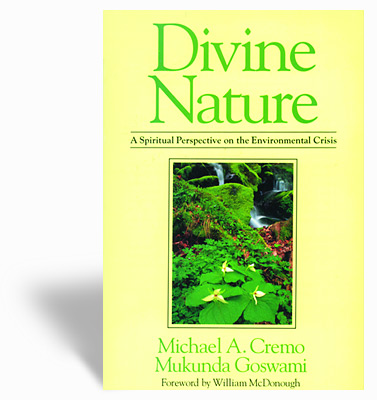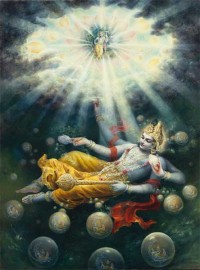
Among those who see the need for fundamental change in human consciousness are the deep ecologists. “Deep ecology is a process of ever-deeper questioning of ourselves, the assumptions of the dominant worldview of our culture, and the meaning and truth of our reality,” say two prominent theorists of this movement, Bill Devall and George Sessions.
We agree with the deep sociologists that modern civilization raises obstacles to this process of inquiry. “In technocratic industrial societies there is overwhelming propaganda and advertising which encourages false needs and destructive desires designed to foster increased production and consumption of goods,” say Devall and Sessions. “Most of this actually diverts us from facing reality in an objective way and from beginning the ‘real work’ of spiritual growth and maturity.”
Deep ecologists would like to see much of the world returned to wilderness. They also speak of the “biocentic equality” of all living things. By this they mean that “all things in the biosphere have an equal right to live and blossom and to reach their own individual forms of unfolding and self-realization within the larger self-realization.”
Members of the International Society for Krishna Consciousness, while sympathetic to some of the goals of the deep ecologists, differ with them about the ultimate sense in which all creatures “reach their own individual forms of unfolding and self-realization within the larger Self-realization.” For the deep ecologists, this process takes place solely within nature. The “larger Self-realization” is simply that of nature unfolding according to its own laws. As far as humanity’s self-realization is concerned, this would amount to humans as a species taking a more humble position relative to nature and other living things. But this holistic vision, although an improvement over humanity’s present exploitive behavior toward nature and other living beings, falls short of a genuine spirituality. It fails to take in account the eternal identities of all living things beyond their situation in material nature. These eternal identities become revealed not simply in relation to nature and other living things but in relation to God, who is present both in nature and beyond nature and who is the source of both nature and the living things in nature.
An equality of vision more satisfactory than that of the deep ecologists was possessed by the ancient sages of India, whose teachings the members of the modern Krsna consciousness movement follow.
“The humble sages, by virtue of true knowledge, see with equal vision a learned and gentle brahmana, a cow, an elephant, a dog, and a dog-eater [outcaste],” says the Bhagavad Gita (5.19).
A Krsna conscious person does not make any distinction between species or castes,” comments Srila Prabhupada on this text in his Bhagavad Gita As It Is. “The brahmana and the outcaste may be different from the social point of view, or a dog, a cow, and an elephant may be different from a species point of view, but these differences are meaningless to the learned transcendentalist. This is due to their relationship with the Supreme.”
Each living thing is not simply a material form that finds its proper place within material nature. Each living thing is also possessed of a soul, which has an eternal relationship with God , who exists beyond material nature. Of course, nature is the energy of God, and God is present in His energy as well as beyond it. So it is possible for those who properly align their souls with God and with the souls of other living things to also properly align their material bodies with God’s material nature and the material bodies of other living things. This is a more complete self-realization than that of deep ecology.
Applying a vision of the theocentric equality of all living things, the International Society for Krishna Consciousness addresses the deep philosophical and spiritual issues that touch on the self and nature, while it simultaneously introduces a way of life that situates the self harmoniously within nature.
-excerpt from Divine Nature by Micheal A. Cremo and Mukunda Goswami
Filed under: Vedic Ecology

“A crane stands on the edge of a pond that is always disturbed by flowing water, mud, and stones. The crane is like a householder who is disturbed in the shelter of his home but who, because of too much attachment, does not want to change his position.”
–Light of the Bhagavata, Verse 19
(c) The Bhaktivedanta Book Trust International, Inc.
Filed under: Uncategorized
This is a trailer for Ben Stein’s new film, Expelled: No Intelligence Allowed, a documentary on the resistance of the academic and scientific community to allow open debate and public discussion on the possibility of intelligent causation. Ben Stein interviews some of the world’s leading scientists, mathematicians, and theologists to uncover an unprecedented state of modern science where such theories of Darwin and Richard Dawkins are dogmatically left uncontested despite mounting evidence of new probabilities.
Article found at Permaworld Foundation
The meat industry is one of the most destructive ecological industries on the planet. The raising and slaughtering of pigs, cows, sheep, turkeys and chickens not only utilizes vast areas of land and vast quantities of water, but it is a greater contributor to greenhouse gas emissions than the automobile industry. The seafood industry is literally plundering the ocean of life and some fifty percent of fish caught from the oceans is fed to cows, pigs, sheep, chickens etc in the form of fish meal. It also takes about fifty fish caught from the sea to raise one farm raised salmon.
We have turned the domestic cow into the largest marine predator on the planet. The hundreds of millions of cows grazing the land and farting methane consume more tonnage of fish than all the world’s sharks, dolphins and seals combined. Domestic housecats consume more fish, especially tuna, than all the world’s seals.
So why is it that all the world’s large environmental and conservation groups are not campaigning against the meat industry? Why did Al Gore’s film Inconvenient Truth not mention the inconvenient truth that the slaughter industry creates more greenhouse gases than the automobile industry? Continue reading
Filed under: Education, Environmental Politics, Morality, The Mother of Science
by Jayadvaita Swami
Twenty years ago, no one gave a damn. You could gum up a river with factory sludge, chop down rain forests wholesale, spray fluorocarbons into the air like a kid sprinkling confetti, and no one would say boo.
No longer. Grade-school kids want to grow up to be ecologists. New York tycoons sort their trash to recycle. Rock singers play concerts to save prairies and wetlands. Political candidates tell us they’re worried about the fate of the three-toed baboon.
Caring about the environment helps you feel good about yourself. At the supermarket you choose paper instead of plastic. You write your thank-you notes on cards made from ground-up newsprint and cotton waste. You chip in a few dollars for Greenpeace. Hey, you care about the earth. You’re a righteous human being.
Yet too often our concern for the earth lacks a metaphysical grounding. Intuitively, living in harmony with the earth feels right. If the earth is the house we’re going to live in, why litter the rooms with beer cans or pee all over the carpet?
But in an ultimate sense, so what? If life is just a series of chemical reactions, what does it matter if the chemicals go messy? Species come and species go. Why get all mushy and teary-eyed if a few berserk bipeds wipe out some hundred thousand kinds of their neighbors? The earth may be our mother, but sooner or later she’s going to blow to atomic dusting powder anyway. And from a cosmic point of view that’s just a few mega-moments down the line. So why all the fuss?
You can say it’s for our children, it’s for future generations. But they’re also just a flash in eternity. Why bother for them?
Guardians of the green remind us urgently that dirtying and devouring the earth is short-sighted. But to be far-sighted we have to look beyond what seems clean, pleasant, and harmonious on a physical spot of earth on a brief ride through the universe. We have to ask ourselves not only how well we’re treating the earth but why we’re on it and where we are ultimately going.
Otherwise, though ecologically aware, we’re metaphysically dead.
Filed under: Vedic Ecology

“Many plants and creepers that were almost dead during the months of April and May are now visible again in various forms, for they are nourished by their roots in the moist earth. These numberless plants and creepers resemble persons who dry up in severe penances for some material gain but then achieve their objectives and become luxuriously fat, nourished by sense enjoyment.”
–Light of the Bhagavata, Verse 18
 "We do not condemn modern civilization but we don't like to get it at the cost of God Consciousness, that is suicide."
__________________________________
The Beauty of Beans
"We do not condemn modern civilization but we don't like to get it at the cost of God Consciousness, that is suicide."
__________________________________
The Beauty of Beans
 "One acre of beans produces ten times more protein than an acre of pasture set aside for meat production." -Higher Taste
"One acre of beans produces ten times more protein than an acre of pasture set aside for meat production." -Higher Taste
 Moundsville, West Virginia
_________________________________
ISKCON Gita Nagari Farm Community
Moundsville, West Virginia
_________________________________
ISKCON Gita Nagari Farm Community
 Port Royal, Pennsylvania
_________________________________
ISKCON New Goloka Farm Community
Port Royal, Pennsylvania
_________________________________
ISKCON New Goloka Farm Community
 Hillsborough, North Carolina
_________________________________
ISKCON New Talavan Farm Community
Hillsborough, North Carolina
_________________________________
ISKCON New Talavan Farm Community
 Carriere, Mississippi
_________________________________
ISKCON Saranagati Eco-Village
Carriere, Mississippi
_________________________________
ISKCON Saranagati Eco-Village
 British Columbia, Canada
_______________________________
ISKCON Gaura Vrindaban
British Columbia, Canada
_______________________________
ISKCON Gaura Vrindaban
 Paraty, Brazil
_________________________________
ISKCON Krishna Valley Farm Community
Paraty, Brazil
_________________________________
ISKCON Krishna Valley Farm Community
 Somogyvamos, Hungary
_________________________________
Bhaktivedanta Eco-Village
Somogyvamos, Hungary
_________________________________
Bhaktivedanta Eco-Village
 Sagar Taluq, South India
_________________________________
ISKCON Cow Protection
Sagar Taluq, South India
_________________________________
ISKCON Cow Protection
 "There are so many facilities afforded by cow protection, but people have forgotten these arts. The importance of protecting cows is therefore stressed by Krsna in Bhagavad-gita (krsi-go-raksya-vanijyam vaisya-karma svabhavajam [Bg. 18.44]). Even now in the Indian villages surrounding Vrndavana, the villagers live happily simply by giving protection to the cow. They keep cow dung very carefully and dry it to use as fuel. They keep a sufficient stock of grains, and because of giving protection to the cows, they have sufficient milk and milk products to solve all economic problems. Simply by giving protection to the cow, the villagers live so peacefully. Even the urine and stool of cows have medicinal value."
-Srila Prabhupada
_________________________________
"There are so many facilities afforded by cow protection, but people have forgotten these arts. The importance of protecting cows is therefore stressed by Krsna in Bhagavad-gita (krsi-go-raksya-vanijyam vaisya-karma svabhavajam [Bg. 18.44]). Even now in the Indian villages surrounding Vrndavana, the villagers live happily simply by giving protection to the cow. They keep cow dung very carefully and dry it to use as fuel. They keep a sufficient stock of grains, and because of giving protection to the cows, they have sufficient milk and milk products to solve all economic problems. Simply by giving protection to the cow, the villagers live so peacefully. Even the urine and stool of cows have medicinal value."
-Srila Prabhupada
_________________________________
 "The Personality of Godhead is perfect and complete, and because He is completely perfect, all emanations from Him, such as this phenomenal world, are perfectly equipped as complete wholes. Whatever is produced of the Complete Whole is also complete in itself. Because He is the Complete Whole, even though so many complete units emanate from Him, He remains the complete balance."
_________________________________
MANTRA ONE
"The Personality of Godhead is perfect and complete, and because He is completely perfect, all emanations from Him, such as this phenomenal world, are perfectly equipped as complete wholes. Whatever is produced of the Complete Whole is also complete in itself. Because He is the Complete Whole, even though so many complete units emanate from Him, He remains the complete balance."
_________________________________
MANTRA ONE
 "Everything animate or inanimate that is within the universe is controlled and owned by the Lord. One should therefore accept only those things necessary for himself, which are set aside as his quota, and one should not accept other things, knowing well to whom they belong."
_________________________________
MANTRA TWO
"Everything animate or inanimate that is within the universe is controlled and owned by the Lord. One should therefore accept only those things necessary for himself, which are set aside as his quota, and one should not accept other things, knowing well to whom they belong."
_________________________________
MANTRA TWO
 "One may aspire to live for hundreds of years if he continuously goes on working in that way, for that sort of work will not bind him to the law of karma. There is no alternative to this way for man."
_________________________________
MANTRA THREE
"One may aspire to live for hundreds of years if he continuously goes on working in that way, for that sort of work will not bind him to the law of karma. There is no alternative to this way for man."
_________________________________
MANTRA THREE
 "The killer of the soul, whoever he may be, must enter into the planets known as the worlds of the faithless, full of darkness and ignorance."
_________________________________
MANTRA FOUR
"The killer of the soul, whoever he may be, must enter into the planets known as the worlds of the faithless, full of darkness and ignorance."
_________________________________
MANTRA FOUR
 "Although fixed in His abode, the Personality of Godhead is swifter than the mind and can overcome all others running. The powerful demigods cannot approach Him. Although in one place, He controls those who supply the air and rain. He surpasses all in excellence."
_________________________________
MANTRA FIVE
"Although fixed in His abode, the Personality of Godhead is swifter than the mind and can overcome all others running. The powerful demigods cannot approach Him. Although in one place, He controls those who supply the air and rain. He surpasses all in excellence."
_________________________________
MANTRA FIVE
 "The Supreme Lord walks and does not walk. He is far away, but He is very near as well. He is within everything, and yet He is outside of everything."
_________________________________
MANTRA SIX
"The Supreme Lord walks and does not walk. He is far away, but He is very near as well. He is within everything, and yet He is outside of everything."
_________________________________
MANTRA SIX
 "He who sees everything in relation to the Supreme Lord, who sees all living entities as His parts and parcels, and who sees the Supreme Lord within everything never hates anything or any being."
_________________________________
MANTRA SEVEN
"He who sees everything in relation to the Supreme Lord, who sees all living entities as His parts and parcels, and who sees the Supreme Lord within everything never hates anything or any being."
_________________________________
MANTRA SEVEN
 "One who always sees all living entities as spiritual sparks, in quality one with the Lord, becomes a true knower of things. What, then, can be illusion or anxiety for him?"
_________________________________
MANTRA EIGHT
"One who always sees all living entities as spiritual sparks, in quality one with the Lord, becomes a true knower of things. What, then, can be illusion or anxiety for him?"
_________________________________
MANTRA EIGHT
 "Such a person must factually know the greatest of all, the Personality of Godhead, who is unembodied, omniscient, beyond reproach, without veins, pure and uncontaminated, the self-sufficient philosopher who has been fulfilling everyone's desire since time immemorial."
_________________________________
MANTRA NINE
"Such a person must factually know the greatest of all, the Personality of Godhead, who is unembodied, omniscient, beyond reproach, without veins, pure and uncontaminated, the self-sufficient philosopher who has been fulfilling everyone's desire since time immemorial."
_________________________________
MANTRA NINE
 "Those who engage in the culture of nescient activities shall enter into the darkest region of ignorance. Worse still are those engaged in the culture of so-called knowledge."
_________________________________
MANTRA TEN
"Those who engage in the culture of nescient activities shall enter into the darkest region of ignorance. Worse still are those engaged in the culture of so-called knowledge."
_________________________________
MANTRA TEN
 "The wise have explained that one result is derived from the culture of knowledge and that a different result is obtained from the culture of nescience."
_________________________________
MANTRA ELEVEN
"The wise have explained that one result is derived from the culture of knowledge and that a different result is obtained from the culture of nescience."
_________________________________
MANTRA ELEVEN
 "Only one who can learn the process of nescience and that of transcendental knowledge side by side can transcend the influence of repeated birth and death and enjoy the full blessings of immortality."
_________________________________
MANTRA TWELVE
"Only one who can learn the process of nescience and that of transcendental knowledge side by side can transcend the influence of repeated birth and death and enjoy the full blessings of immortality."
_________________________________
MANTRA TWELVE
 "Those who are engaged in the worship of demigods enter into the darkest region of ignorance, and still more so do the worshipers of the impersonal Absolute."
_________________________________
MANTRA THIRTEEN
"Those who are engaged in the worship of demigods enter into the darkest region of ignorance, and still more so do the worshipers of the impersonal Absolute."
_________________________________
MANTRA THIRTEEN
 "It is said that one result is obtained by worshiping the supreme cause of all causes and that another result is obtained by worshiping what is not supreme. All this is heard from the undisturbed authorities, who clearly explained it."
_________________________________
MANTRA FOURTEEN
"It is said that one result is obtained by worshiping the supreme cause of all causes and that another result is obtained by worshiping what is not supreme. All this is heard from the undisturbed authorities, who clearly explained it."
_________________________________
MANTRA FOURTEEN
 "One should know perfectly the Personality of Godhead Śrī Kṛṣṇa and His transcendental name, form, qualities and pastimes, as well as the temporary material creation with its temporary demigods, men and animals. When one knows these, he surpasses death and the ephemeral cosmic manifestation with it, and in the eternal kingdom of God he enjoys his eternal life of bliss and knowledge."
_________________________________
MANTRA FIFTEEN
"One should know perfectly the Personality of Godhead Śrī Kṛṣṇa and His transcendental name, form, qualities and pastimes, as well as the temporary material creation with its temporary demigods, men and animals. When one knows these, he surpasses death and the ephemeral cosmic manifestation with it, and in the eternal kingdom of God he enjoys his eternal life of bliss and knowledge."
_________________________________
MANTRA FIFTEEN
 "O my Lord, sustainer of all that lives, Your real face is covered by Your dazzling effulgence. Kindly remove that covering and exhibit Yourself to Your pure devotee."
_________________________________
MANTRA SIXTEEN
"O my Lord, sustainer of all that lives, Your real face is covered by Your dazzling effulgence. Kindly remove that covering and exhibit Yourself to Your pure devotee."
_________________________________
MANTRA SIXTEEN
 "O my Lord, O primeval philosopher, maintainer of the universe, O regulating principle, destination of the pure devotees, well-wisher of the progenitors of mankind, please remove the effulgence of Your transcendental rays so that I can see Your form of bliss. You are the eternal Supreme Personality of Godhead, like unto the sun, as am I."
_________________________________
MANTRA SEVENTEEN
"O my Lord, O primeval philosopher, maintainer of the universe, O regulating principle, destination of the pure devotees, well-wisher of the progenitors of mankind, please remove the effulgence of Your transcendental rays so that I can see Your form of bliss. You are the eternal Supreme Personality of Godhead, like unto the sun, as am I."
_________________________________
MANTRA SEVENTEEN
 "Let this temporary body be burnt to ashes, and let the air of life be merged with the totality of air. Now, O my Lord, please remember all my sacrifices, and because You are the ultimate beneficiary, please remember all that I have done for You."
_________________________________
MANTRA EIGHTEEN
"Let this temporary body be burnt to ashes, and let the air of life be merged with the totality of air. Now, O my Lord, please remember all my sacrifices, and because You are the ultimate beneficiary, please remember all that I have done for You."
_________________________________
MANTRA EIGHTEEN
 "O my Lord, as powerful as fire, O omnipotent one, now I offer You all obeisances, falling on the ground at Your feet. O my Lord, please lead me on the right path to reach You, and since You know all that I have done in the past, please free me from the reactions to my past sins so that there will be no hindrance to my progress."
"O my Lord, as powerful as fire, O omnipotent one, now I offer You all obeisances, falling on the ground at Your feet. O my Lord, please lead me on the right path to reach You, and since You know all that I have done in the past, please free me from the reactions to my past sins so that there will be no hindrance to my progress."